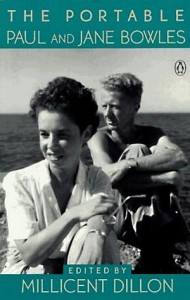 Millicent Dillon is the world’s expert on Jane and Paul Bowles, one of America’s most extraordinary and puzzling literary couples—both cutting-edge literary geniuses, expatriates in Tangier before and after WWII, both gay and yet devoted to each other for 35 years, even throughout Jane’s terrible 16-year illness after her stroke at the young age of 40 until her tragic death.
Millicent Dillon is the world’s expert on Jane and Paul Bowles, one of America’s most extraordinary and puzzling literary couples—both cutting-edge literary geniuses, expatriates in Tangier before and after WWII, both gay and yet devoted to each other for 35 years, even throughout Jane’s terrible 16-year illness after her stroke at the young age of 40 until her tragic death.
Dillon’s biography, You Are Not I: A Portrait of Paul Bowles, explores the life and charismatic character of the man who is, arguably, single-handedly responsible for today’s mega-popular “edgy” dark literature. Among other work, Paul wrote his four frightening and beautiful novels, The Sheltering Sky, Let It Come Down, The Spider’s House, Up Above the World, and the shockingly realistic 1940s stories of violence, sex, and alien culture, “A Distant Episode,” “The Delicate Prey,” and “Pages from Cold Point,” (collected in A Distant Episode and The Delicate Prey: And Other Stories), which long before dark literature became popular or even acceptable in the mainstream “opened the world of Hip,” Norman Mailer said later, “and let in the murder, the drugs, the incest. . .the end of civilization.”
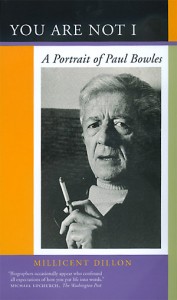
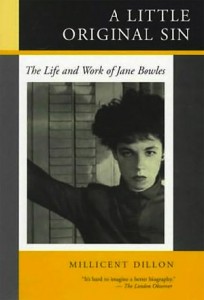 Even more fascinating is Dillon’s wonderful A Little Original Sin: The Life and Work of Jane Bowles, the only biography of Paul’s brilliant wife Jane, author of one Broadway play, In the Summer House, a handful of stories, a puppet play, and the 1943 novel Two Serious Ladies, all published in My Sister’s Hand in Mine: The Collected Works of Jane Bowles, and of which Two Serious Ladies has just been reissued by Sort of Books in the UK. Jane, even more than Paul, was a writer of such unique talent and vision that even those literary experts who embrace experimentalists like James Joyce and William Faulkner have never known what to do with her.
Even more fascinating is Dillon’s wonderful A Little Original Sin: The Life and Work of Jane Bowles, the only biography of Paul’s brilliant wife Jane, author of one Broadway play, In the Summer House, a handful of stories, a puppet play, and the 1943 novel Two Serious Ladies, all published in My Sister’s Hand in Mine: The Collected Works of Jane Bowles, and of which Two Serious Ladies has just been reissued by Sort of Books in the UK. Jane, even more than Paul, was a writer of such unique talent and vision that even those literary experts who embrace experimentalists like James Joyce and William Faulkner have never known what to do with her.
For much of the past year, I’ve corresponded and talked with Dillon about her work on the Bowleses. Although Jane died in 1973 (rumored to be poisoned with love potions by her Moroccan lover, Cherifa), Dillon knew Paul well, up until his death only ten years ago.
Millicent, I must credit you with my entire bibliography on Paul and Jane. I knew nothing about them when I picked up A Little Original Sin fifteen years ago, and they have both been enormously influential to me ever since.
So let’s talk first about Jane’s life as a writer, because it was not easy. Jane published before Paul did, and it was his work with her on Two Serious Ladies that inspired him to try his hand at fiction. Yet she sank rather quickly into literary obscurity and put her energy into assuring Paul that she didn’t mind if he was the more successful or if people at her publisher [Knopf] pretended not to know whom she was. What do you think her real feelings were about being overshadowed in the world of literature by her (very talented) husband?
The relationship between Jane’s work and Paul’s work was as complex as the relationship between the two of them. In that relationship she looked to him for support (including economic support) as well as early on, as with Two Serious Ladies, with shaping the work in terms of form—so that he suggested taking out the third serious lady, and she readily agreed. In her early letters, when he does start publishing, stories at first, and then getting the novel contract, you can hear the anguish in her voice. She admits to jealousy and then tries to smooth it over, but it’s obviously there. In the same way she suffered from his relationship with [his long-term lover] Ahmed Yacoubi.
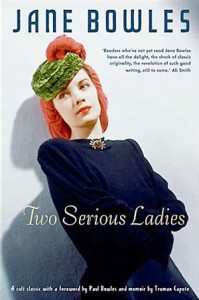 As for Paul, he continuously encouraged her to work, and even said once that he would not see her if she did not work. I would guess, though of course, it is only speculation, that it was not his publishing his own work that made her own work so hard for her, it was a whole host of problems that she had to deal with. The rivalry, the jealousy could have been overcome. But the forces within her that she was fighting were never appeased.
As for Paul, he continuously encouraged her to work, and even said once that he would not see her if she did not work. I would guess, though of course, it is only speculation, that it was not his publishing his own work that made her own work so hard for her, it was a whole host of problems that she had to deal with. The rivalry, the jealousy could have been overcome. But the forces within her that she was fighting were never appeased.
Incidentally, Jane’s play was produced several years after Paul had been publishing. He wrote the music for the play. She anguished over that play for years, tried one version, then the next, and could not ultimately make it cohere. There are wonderful things in it, but it too suffers from her anguish about her own decisions.
If Jane had been a man, do you think her fiction would be more widely-known today? Do you think she would have been classed with the more famous male experimental writers, whom she in many ways completely surpassed?
Jane, as you may know, has never been taken up by the feminists. In fact, I don’t think you can strictly speaking regard her as a feminist. If you remember, she thought in very conservative terms about marriage, her marriage to Paul. He was to provide for her, and she was to take care of the house, etcetera. She never seemed to have any objections to that. Here again I am speculating, but I don’t think feminist ideas as such play a large role in her work. She did not think in general terms, in any case.
You ask if a man who wrote as she did would be more famous? A man, of course, could not write as she did.
As for fame, Victoria, think of the many wonderful writers who have fallen into obscurity in this time of no-lasting impact.
How did she do it—how did Jane achieve such economy, insight, and sheer comedy, while simultaneously giving the impression she was an amateur simply playing around with words? Have you ever tried to imitate her work to see how it’s done?
Once Jane got into the writing of Two Serious Ladies, she never thought of herself as an amateur. In some strange way, she knew how good she was, compared herself favorably to Carson McCullers, for example. Yet even though she knew how good she was, the anguish was always there. I was not and am not into literary psychoanalysis, but she opens herself up in the work and in the letters so that you can see all these forces within her. And at the same time, her terrible anguish about any decision.
No, I have never tried to imitate Jane’s style. I am not into imitation. I’ve spent forty years trying to find my own style.
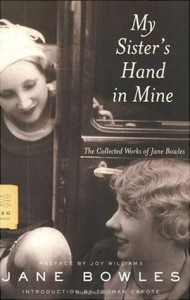 It seems to me the forces within her were based largely upon her relationship with her mother—with her role as Claire’s “million-dollar baby.” Jane’s work appears to be about exploring that relationship from myriad angles: from that of the daughter who retreats in submission and longing; the daughter who rebels and runs wild; the mother with an iron will; and the mother blind to her own extreme dependence. In much of her work these relationships appear as intimate relationships between peers—even sisters—yet the grappling with the power imbalance is always there.
It seems to me the forces within her were based largely upon her relationship with her mother—with her role as Claire’s “million-dollar baby.” Jane’s work appears to be about exploring that relationship from myriad angles: from that of the daughter who retreats in submission and longing; the daughter who rebels and runs wild; the mother with an iron will; and the mother blind to her own extreme dependence. In much of her work these relationships appear as intimate relationships between peers—even sisters—yet the grappling with the power imbalance is always there.
Yes, it does seem clear that was a very powerful force for her in the way you describe it. Yet I also feel that the struggle in her, as in any human being, is more complex than any single issue. This is where literature begins to depart from psychoanalysis, which is after all a therapy intended to bring the patient into a greater adaptation to the world.
I cannot speak of this in very simple straightforward terms because of the complexity of human emotions. That is what I see so strongly in Jane. It is as though multiple forces assail her, and she is continuously buffeted by them from all sides. What makes her different from others, in a certain sense, is that she has no defense against the multiplicity. If she could have said, “My mother did this to me or that to me,” it would have been simpler for her. But instead, I suspect, she would think of herself as assailed one way and then by another.
Jane’s work is replete with insight into paradox. Whenever she finds a fundamental truth, she immediately progresses beyond it to its antithesis. I think the basis of this must have been in the overwhelming duality of her feelings about her mother—the pampering that gave Jane, ultimately, her faith in her abilities, along with the blatant use of Jane for Claire’s emotional well-being.
My immediate response, with respect to Claire, is to recall the strangeness of Claire taking Jane to Switzerland for treatment in the sanatorium [when 13-year-old Jane contracted tuberculosis of the knee shortly after her father died] and then going off and leaving her there while she went to Paris. In Paris, Claire was pursuing her own version of finding a new life, romantic and otherwise. I could bet she didn’t see anything wrong with this, though it is difficult for me to reconcile that choice with Claire’s constant expression of devotion for Jane. No doubt there was something in Claire that could deceive herself easily.
I do think about Jane that her relation to her family of women and its authoritarianism makes her a figure that is in some way incomprehensible to young women now. I remember giving a talk about the book to a group of women, many of whom were irate because she did not break away, they thought, from the constraints upon her, and, in fact, blamed her.
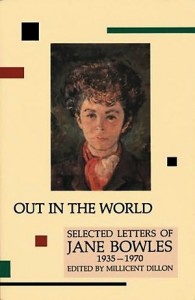 What did they think she was doing in Morocco in the 1940s, making excuses to Moroccan women [as she described in “Everything is Nice”] when they asked, “Why do you not sit in your mother’s house?” I remember Paul saying that they got married partly so Jane could travel, as she could not have traveled alone in that era. She went to enormous lengths to escape, to the extent that she eventually died of her extremist life in Tangier, suffering terrible pyschiatric handicaps due to that stroke and ensuing difficulties, many years before her time.
What did they think she was doing in Morocco in the 1940s, making excuses to Moroccan women [as she described in “Everything is Nice”] when they asked, “Why do you not sit in your mother’s house?” I remember Paul saying that they got married partly so Jane could travel, as she could not have traveled alone in that era. She went to enormous lengths to escape, to the extent that she eventually died of her extremist life in Tangier, suffering terrible pyschiatric handicaps due to that stroke and ensuing difficulties, many years before her time.
When I would talk to Paul about Jane in her later years when she was so ill, I would say, with a certain hubris, “But she was still Jane, wasn’t she?” Paul would deny it. Now, so many years later, after going through experiences with friends who suffered from conditions similar to Jane’s, if not exactly the same, and after being torn by grief, anger, etcetera, etcetera, I think I was both wrong and right.
I would like to think some more about Jane’s physical vulnerability, about her relationship to her own body, or at least try to speculate about it. Jane at times seemed almost oblivious to her body. When she called herself “Crippie Kike Dyke,” did she think it was funny? Or was she being more bitter than funny? Think about what it would be for a teenage girl to be in bed in traction for months upon months.
I think she was both fearless and very fearful at the same time, and this would result in her paying no attention to her body at times and at other times being obsessive about it, worrying about it and how it could be damaged.
Why was writing so terribly hard for her? She was pushed to do it and yet pushed not to do it. She is always, I think, subject to opposing forces and cannot choose what side she is on. Decisions of any kind are a torment to her. So in some way, I suspect, despite her anger at her mother, there also existed in her tenderness, if not love, rage, despair, maybe even sympathy.
I suppose what I’m saying is that the multiplicity is there for all of us, but she could not placate it, keep it quiet.
There is also this about Claire. She seems to have been of ordinary—even limited—sensibility, someone interested in clothes, propriety, middle-class values from her family, a family that she never escaped from, maybe never even knew the impulse to escape from them. One of the ways I see it is that Claire was not an equal antagonist, and as a result Jane had to build her up more and more in her mind to create a true antagonist. This she did with her imagination, and by so doing, was more of a prisoner of that imagined Claire than the real one. But how could Jane fight her own imagination? It is in this realm—the realm of her own imagination—that Jane had to fight out her most serious battles. And no one could help her with that.
And yet, despite all that was so dark in her life, it is important to turn again to her work. Reading it, one sees how remarkable and how innovative it is even after all this time, how funny and surprising it is and profound. Perhaps that’s the most surprising thing of all, how profound it is.
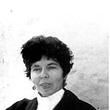 Millicent Dillon is the winner of five O. Henry Awards, as well as being a PEN/Faulkner nominee for her fictional biography, Harry Gold, and the recipient of a Guggenheim Fellowship, two National Endowment for the Humanities Fellowships, and a residency at Yaddo artists working community, the Rockefeller Foundation in Bellagio, Italy, and the Djerassi Foundation in Woodside, California. She is the author of three other novels, The One in the Back is Medea, The Dance of the Mothers, and A Version of Love: A Novel, a collection, Baby Perpetua and Other Stories, and three biographies, A Little Original Sin: The Life and Work of Jane Bowles, You Are Not I: A Portrait of Paul Bowles, and After Egypt: Isadora Duncan and Mary Cassatt, a Dual Biography, all of which are available through Amazon’s Millicent Dillon Page. She is also the editor of two collections, Out in the World: Selected Letters of Jane Bowles, 1935-1970 and The Viking Portable Paul and Jane Bowles. Her own papers are archived in the Harry Ransome Humanities Research Center at the University of Austin, Texas. She lives and writes in Northern California.
Millicent Dillon is the winner of five O. Henry Awards, as well as being a PEN/Faulkner nominee for her fictional biography, Harry Gold, and the recipient of a Guggenheim Fellowship, two National Endowment for the Humanities Fellowships, and a residency at Yaddo artists working community, the Rockefeller Foundation in Bellagio, Italy, and the Djerassi Foundation in Woodside, California. She is the author of three other novels, The One in the Back is Medea, The Dance of the Mothers, and A Version of Love: A Novel, a collection, Baby Perpetua and Other Stories, and three biographies, A Little Original Sin: The Life and Work of Jane Bowles, You Are Not I: A Portrait of Paul Bowles, and After Egypt: Isadora Duncan and Mary Cassatt, a Dual Biography, all of which are available through Amazon’s Millicent Dillon Page. She is also the editor of two collections, Out in the World: Selected Letters of Jane Bowles, 1935-1970 and The Viking Portable Paul and Jane Bowles. Her own papers are archived in the Harry Ransome Humanities Research Center at the University of Austin, Texas. She lives and writes in Northern California.

A great interview! Thanks! And I hadn’t heard of Millicent Dillon’s work before. Thanks for introducing me. 🙂
Thanks, Michelle. I’ve been fascinated by Jane Bowles ever since Millicent introduced me to her, and not just because Jane was such a fascinating person, but because Millicent’s biography of her is a rich, intriguing exploration of the life of this baffling woman, rather than just the standard biographical laundry list.
A Little Original Sin is still, after 15 years, my favorite biography ever. And I’ve read a LOT of biographies.
Thanks for your interview, the probing questions, the sympathetic and detailed responses by Ms. Dillon. I first came to Jane’s work in the late 70s and was baffled by it though I could not put it out of my mind. I was thrilled with Ms. Dillon’s biography when it appeared in 1981, have owned several copies, read it several times, and have since read Jane’s works numerous times as well. I’m pleased to see that she and Ms. Dillon are still receiving the consideration they should.
They’re wonderful, aren’t they? It was A Little Original Sin that first introduced me to Jane Bowles and her extraordinary work, and that’s still the best biography on anybody that I’ve ever read. (I read a lot of literary biographies.)
Millicent Dillon is an amazing woman in her own right. I am still in touch with her—we both live around the San Francisco Bay Area and visit when we get the chance. As well as winning five O. Henrys and a handful of other literary awards, Millicent is a physicist who worked at Oakridge in 1947, only two years after the bombing of Hiroshima and Nagasaki. She’s written about it recently in The Believer. She also has an autobiography that’s making the rounds of New York under the auspices of one of our most venerable literary agencies—although its striking lack of cheap commercialism is making it a hard sell.
If you know a publisher who wants the riveting autobiography of a brilliant scientist and award-winning author, please drop me a line!